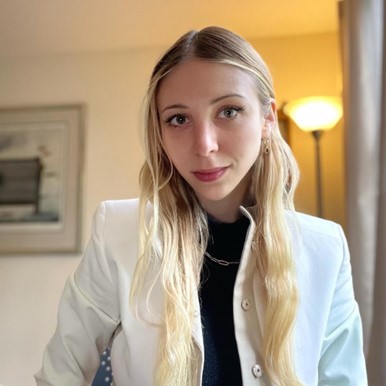As part of Triple Giving November, we are highlighting inspiring individuals whose journeys have made an extraordinary impact. Meet Rebecca, a dedicated advocate for ME/CFS and Long COVID research and a former OMF team member.

Don’t forget! Your $50 donation will triple to $150, $100 becomes $300, and $250 turns into $750. Help fund critical research and bring hope to millions suffering from ME/CFS and Long COVID.

Rebecca’s Journey with ME/CFS
 1. Can you tell us a little bit about yourself and your journey with ME/CFS?
1. Can you tell us a little bit about yourself and your journey with ME/CFS?
I was diagnosed with ME/CFS when I was 20, and this year, I turned 30, marking a decade of living with the condition. It’s been a journey of learning how to manage my energy while pursuing a career in medicine, research, and health communications.
ME/CFS has been both a personal challenge and a professional motivator. I began volunteering with OMF in 2019, which eventually led me to become the Director of Communications there. OMF’s mission and the passion of the people working there inspired me to continue advocating for ME/CFS, even now as I work at Stanford Medicine in science communications. My dedication to this cause remains strong because I know firsthand how life-changing proper research and support can be.
2. What has been the most challenging aspect of living with ME/CFS?
The hardest part of living with ME/CFS is how it affects everything you do. Every action takes energy, and there’s a constant need to be aware of how much I’m using. For someone my age, it’s something you don’t typically think about, but ME/CFS forces you to. I’m always conscious of the potential for post-exertional malaise (PEM), so it feels like I’m constantly trying to balance my energy expenditure. Even though I’m lucky that my ME/CFS is considered mild, it still requires a lot of mental effort to pace myself and avoid setbacks. It’s all about finding the right formula to not overdo it.
3. Through your involvement with OMF, you connected with many others living with ME/CFS. What did you learn from their stories that further motivated your work?
What struck me most was how similar yet different everyone’s experiences were. ME/CFS impacts people in various ways, and no two cases are exactly the same, but what unites everyone is the struggle to be heard, validated, and understood. Hearing their stories reinforced my desire to advocate for more research, better treatments, and increased awareness. It motivated me to help bring more attention to the complexities of this disease, especially through the work of OMF, and it deepened my commitment to help find solutions for this community.
4. Over the years, you’ve seen the progress OMF has made. What are some of the most significant developments that give you hope for ME/CFS research?
OMF has done incredible work in advancing ME/CFS research. The breakthroughs in understanding the biological mechanisms of the disease, particularly in areas like metabolic dysfunction and neuroinflammation, give me a lot of hope. Also, seeing OMF’s Global Collaborative Research Centers bring together so many brilliant scientists to work on finding a cure is inspiring. The progress we’ve seen in diagnostics and biomarkers feels like the beginning of a real change in how ME/CFS is understood and treated in the medical community. These advances make me hopeful that we’re moving closer to treatments that will truly improve patients’ lives.
5. What is one thing you wish every person would understand about chronic, complex diseases such as ME/CFS?
I wish people understood just how life-altering a disease like ME/CFS can be. It’s invisible to many, but the impact it has on someone’s day-to-day life is profound. People with ME/CFS often deal with a lack of recognition and understanding, which adds to the emotional and physical burden. This disease isn’t just about feeling tired; it’s about managing energy like a precious resource, navigating symptoms that can flare up unpredictably, and facing the uncertainty of not knowing when—or if—there will be a cure. I wish more people recognized the resilience it takes to live with a condition like this.
6. What advice would you give to someone newly diagnosed with ME/CFS or struggling with the day-to-day challenges of the disease?
First, be kind to yourself. It’s important to understand your limits. Pacing is key. It’s a difficult balance, and it takes time to figure out what works best for your body.
I won’t sugarcoat it, life with ME/CFS poses a unique set of challenges that some will not understand. Finding a support network, whether through online communities or trusted friends and family, can make a huge difference.
Remember, you don’t have to justify your illness to others. Advocacy for yourself is important, but so is protecting your energy and focusing on what helps you feel your best. Take things one day at a time and celebrate the small victories, even if they may seem minor—those moments of progress matter.
Also, remember that you’re not alone, even when it feels like it. There is hope, and a whole community of people who understand what you’re going through, and there are researchers like those at OMF working every day to find effective treatments.
Thank you for being part of the OMF CA community. Together, we are making strides toward a brighter future for those affected by ME/CFS and Long COVID.
OMFCA also accepts gifts of stock, cryptocurrency, real estate and retirement assets.
Learn more today!